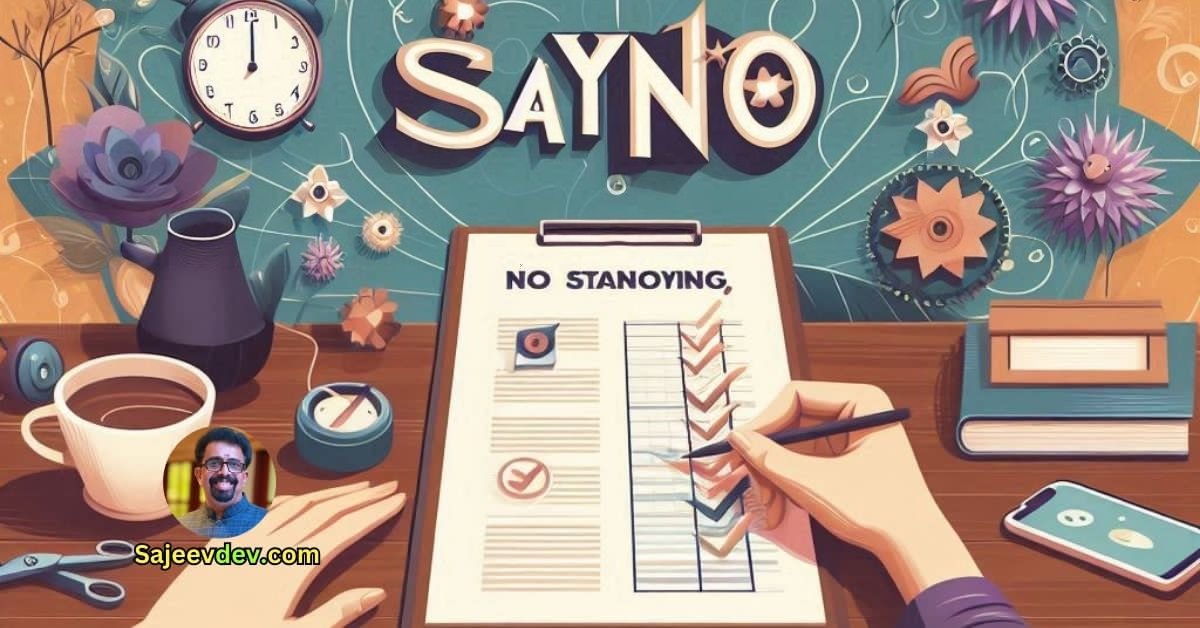In today’s fast-paced world, it often feels like there’s a constant barrage of demands on our time and energy. From work obligations to social commitments, it can be challenging to manage everything without feeling overwhelmed. However, one powerful yet underutilized tool can help us regain control of our lives: the art of saying no. Setting boundaries and declining unnecessary commitments is essential for managing time effectively and maintaining our well-being. Let’s explore why saying no is crucial and how to master this vital skill.
The Importance of Setting Boundaries
Boundaries are the invisible lines that define what we are willing to accept from others and what we expect from ourselves. They help us protect our time, energy, and mental health, ensuring that we can focus on what truly matters. Here are some key reasons why setting boundaries is essential:
- Preserving Mental Health: Constantly saying yes to every request can lead to stress, burnout, and anxiety. By setting boundaries, we create a buffer that protects our mental health and prevents us from becoming overwhelmed.
- Improving Productivity: When we spread ourselves too thin, our productivity suffers. Focusing on fewer commitments allows us to give our best effort and achieve better results in the tasks we do undertake.
- Enhancing Relationships: Healthy boundaries are crucial for maintaining respectful and balanced relationships. They prevent resentment and ensure that interactions with others are based on mutual respect and understanding.
- Boosting Self-Esteem: Saying no and setting boundaries are acts of self-respect. They reinforce the idea that our time and needs are valuable, boosting our confidence and self-worth.
The Challenges of Saying No
Despite its importance, saying no can be challenging for many reasons. We might fear disappointing others, damaging relationships, or missing out on opportunities. Additionally, societal norms often pressure us to be agreeable and accommodating. However, learning to say no gracefully is a skill that can be developed with practice and the right mindset.
How to Master the Art of Saying No
- Understand Your Priorities: Knowing what matters most to you is the first step in setting boundaries. Clarify your goals, values, and responsibilities so that you can make informed decisions about how to allocate your time.
- Be Honest and Direct: When declining a request, it’s important to be clear and straightforward. Avoid vague excuses and simply state that you cannot commit to the request. Honesty builds trust and leaves no room for misunderstandings.
Example: “I appreciate the offer, but I have other commitments that require my attention right now.”
- Offer Alternatives: If you feel inclined to help but can’t commit fully, suggest an alternative solution. This shows that you are considerate and willing to assist in a way that fits your schedule.
Example: “I can’t take on this project right now, but I can help you brainstorm some ideas over the weekend.”
- Practice Self-Compassion: Remember that saying no is not selfish; it is a necessary act of self-care. Be kind to yourself and acknowledge that it’s okay to prioritize your well-being.
- Use Positive Language: Frame your response in a positive manner to soften the impact. Focus on what you can do rather than what you can’t.
Example: “I would love to help with this in the future, but I need to focus on my current projects at the moment.”
- Set Boundaries Early: Establishing boundaries early in relationships or commitments can prevent future conflicts. Communicate your limits clearly from the outset.
Example: “I usually don’t check emails after 7 PM to ensure I have quality family time. I’ll get back to you first thing in the morning.”
Real-Life Applications of Saying No
- Workplace: Politely decline taking on additional tasks that would compromise your ability to complete your current responsibilities effectively. This demonstrates your commitment to quality work.
- Social Life: Respectfully say no to social events or gatherings that don’t align with your interests or that you simply don’t have the bandwidth for.
- Personal Projects: Turn down opportunities that, while tempting, do not align with your long-term goals. This allows you to stay focused and avoid distractions.
- Family Obligations: Set clear boundaries with family members regarding your availability and personal space. Communicate your needs openly and honestly.
Mastering the art of saying no is a crucial skill for managing time and setting boundaries. By understanding your priorities, being honest and direct, and practicing self-compassion, you can protect your time and energy for what truly matters. Remember, every time you say no to something unnecessary, you are saying yes to something important: your well-being, your goals, and your happiness. Embrace the power of saying no and watch as your life becomes more balanced, productive, and fulfilling.Top of Form









